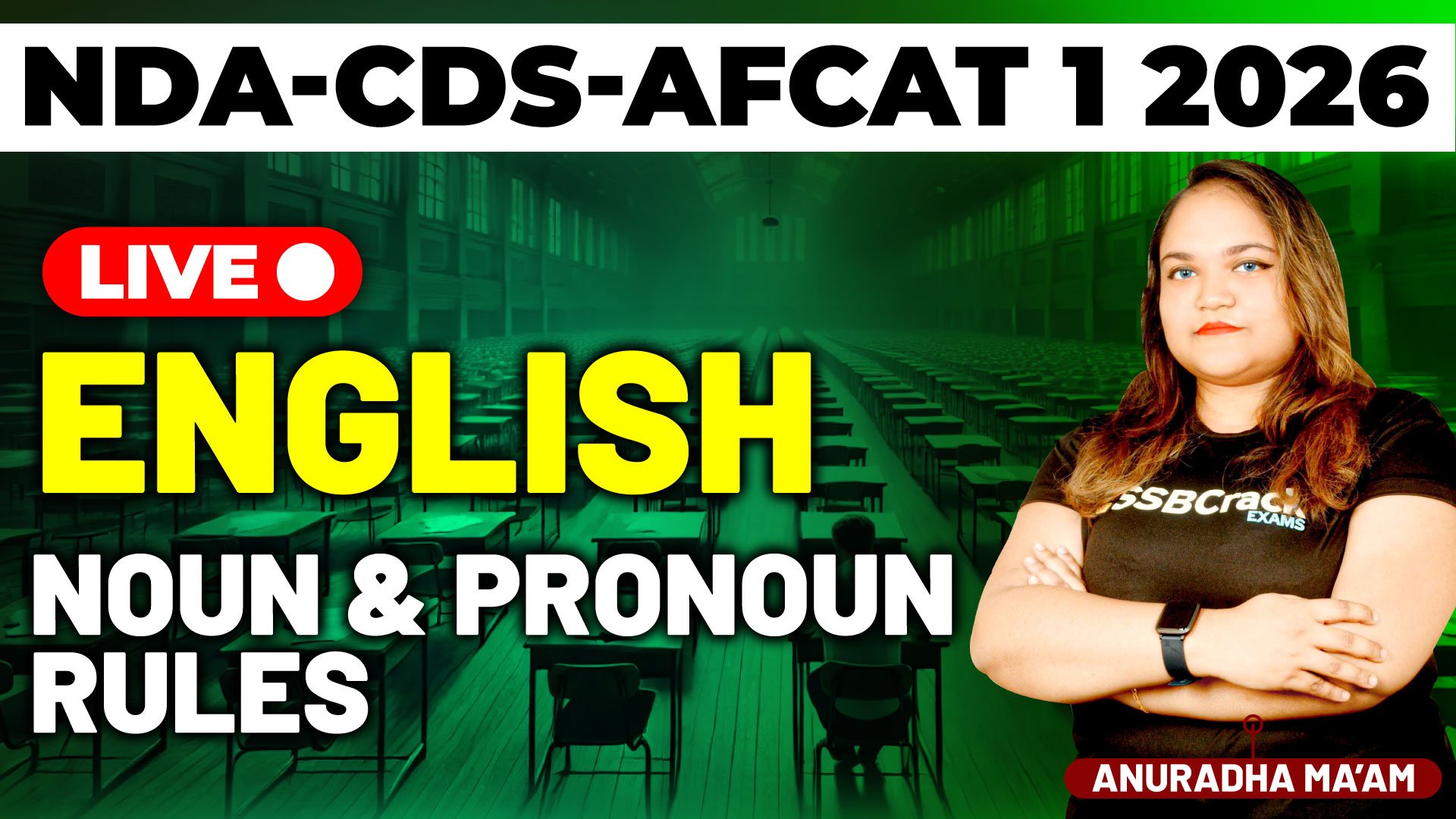Understanding Grammar fundamentals is the first step toward mastering the English section in competitive defence exams like NDA, CDS, and AFCAT. Among these, Noun and Pronoun form the core pillars of grammar — every other rule in English builds upon them. To strengthen this foundation, a dedicated live class on Noun & Pronoun Rules was conducted for aspirants appearing for the NDA, CDS & AFCAT 1 2026 examinations.
This class focused on concept clarity, rule-based learning, and application through questions, ensuring that students not only memorize rules but also understand their logic and usage in exam-oriented contexts.
Objective of the Live Class
The primary aim of this session was to:
- Simplify the fundamental rules of Nouns and Pronouns through examples and explanations.
- Help students identify common grammatical errors based on these topics.
- Strengthen conceptual understanding for use in Spotting Errors, Sentence Improvement, and Fill in the Blanks questions.
- Bridge the gap between theory and application through practice MCQs from previous NDA, CDS & AFCAT papers.
Key Topics Covered in the Class
🔹 1. Noun: Types, Rules, and Usage
A Noun is the naming word — the backbone of every sentence. The class covered not just the types, but the specific rules and exceptions that often appear in defence exams.
✅ Topics Discussed:
- Types of Nouns: Proper, Common, Collective, Material & Abstract Nouns
- Countable and Uncountable Nouns
- Rules of Singular & Plural Nouns (special focus on irregular forms)
- Use of Nouns in Number & Case
- Use of Possessive Case (‘s) – correct and incorrect forms
- Nouns that are always plural (e.g., scissors, trousers)
- Collective Nouns – singular or plural verb usage
- Compound Nouns and their plural forms
- Common error patterns involving Nouns in NDA/CDS previous papers
2. Pronoun: Types, Agreement & Reference Rules
A Pronoun replaces a noun to avoid repetition, but its correct usage requires strong command over agreement and reference rules.
✅ Topics Discussed:
- Types of Pronouns: Personal, Reflexive, Relative, Demonstrative, Interrogative, Indefinite, and Distributive Pronouns
- Agreement of Pronoun with Antecedent in Number, Gender, and Person
- Case of Pronouns (Subjective, Objective, Possessive)
- Use of Reflexive and Emphatic Pronouns
- Common errors in the use of “each other” and “one another”
- Correct use of “who,” “whom,” “whose,” “which,” and “that”
- Indefinite Pronouns (everyone, someone, anybody, each) and their singular usage
- Avoiding Ambiguous Reference of Pronouns
- Pronoun Consistency in Compound Subjects
Practice & Application
During the live class, students practiced:
- Spotting Error Questions involving misplaced or inconsistent pronouns.
- Sentence Correction Exercises focusing on agreement errors.
- Fill in the Blanks questions testing rule-based understanding.
- Previous Year Paper MCQs from NDA, CDS & AFCAT to identify repeating patterns.
This helped candidates apply theoretical knowledge to practical exam situations and build confidence.
Importance of Noun & Pronoun Topics in Defence Exams
✅ For NDA:
- Around 8–10 questions in the English section are directly or indirectly based on Noun & Pronoun rules.
- Most errors in Spotting Error and Sentence Improvement questions stem from agreement or reference mistakes.
✅ For CDS:
- English paper often includes conceptual grammar-based questions, making Pronoun Agreement, Possessive Case, and Countable/Uncountable usage vital.
- High-scoring area when rules are clearly understood.
✅ For AFCAT:
- Focus lies on grammar in context, especially in Fill in the Blanks and Sentence Completion.
- Knowing noun and pronoun consistency rules helps eliminate wrong choices quickly.
Why Mastering Noun & Pronoun is Crucial
- They form the foundation for all grammar rules—understanding them improves comprehension of Tenses, Voice, and Concord.
- Many error-based and structure-based questions rely on accurate usage of Nouns and Pronouns.
- Proper understanding enhances sentence formation, comprehension, and spoken English, which also benefits the SSB Interview communication round.
Conclusion
The Noun & Pronoun Rules Live Class for NDA, CDS & AFCAT 1 2026 provided aspirants with a solid grammatical foundation, essential for scoring high in the English section. By combining rule explanation, conceptual clarity, and practical MCQs, the class ensured that every learner could apply these rules with confidence in any question format.
A strong grip on these topics not only ensures better exam performance but also lays the groundwork for effective communication and written expression, traits essential for every future officer of the Indian Armed Forces.







